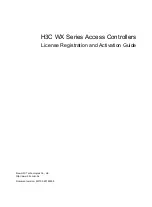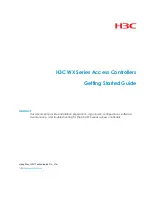
26
ALARM 1 ENABLE/DISABLE SUBMENU:
Press
b
5)
Scroll though the available selection until
ENBL
displays to
use Alarm 1.
Press
d
6)
Display shows
STRD
stored message momentarily and then
advances to
ABSo
only, if it was changed, otherwise press
a
to
advance to
ABSo
Alarm 1 Absolute/Deviation Submenu.
If
DSBL
Alarm 1
Disabled
was selected, all submenus of Alarm
1 Menu will be skipped and meter advances to
ALR2
Alarm 2
Menu. If
ENBL
Alarm 1
Enabled
was selected, Output 1 would
be automatically disabled, and reassigned as Alarm 1.
ALARM 1 ABSOLUTE/DEVIATION SUBMENU:
Press
d
7)
Display flashes previous selection. Press
b
to
ABSo
Absolute or
_DEV
Deviation.
Press
d
8)
Display shows
STRD
stored message momentarily and then
advances to
LTçH
only, if it was changed, otherwise press
a
to
advance to
LTçH
Alarm 1 Latch/Unlatch Submenu.
Absolute
Mode allows Alarm 1 to function independently from Setpoint 1. If the
process being monitored does not change often, then "Absolute" Mode is
recommended.
Deviation
Mode allows changes to Setpoint 1 to be made automatically to
Alarm 1. Deviation Mode is typically the ideal mode if the process temperature
changes often. In Deviation Mode, set Alarm 1 a certain number of degrees or
counts away from Setpoint 1 — this relation remains fixed even if Setpoint 1 is
changed.
ALARM 1 LATCH/UNLATCH SUBMENU:
Press
d
9)
Display flashes previous selection. Press
b
to
LTçH
Latched
or
UNLT
Unlatched.
Press
d
10)
Display shows
STRD
stored message momentarily and then
advances to
CT.CL
only, if it was changed, otherwise press
a
to
advance to
CT.CL
Contact Closure Submenu.
Latched Mode:
Relay remains "latched" until reset. To reset already latched
alarm, select Alarm Latch and press Max twice (i.e. Unlatch and then back to
Latch) or from a Run Mode, push
d
twice to put the controller in Standby Mode
and then push
d
one more time to return to the Run Mode.
Unlatched Mode:
Relay remains latched only as long as the alarm condition is
true.
















































